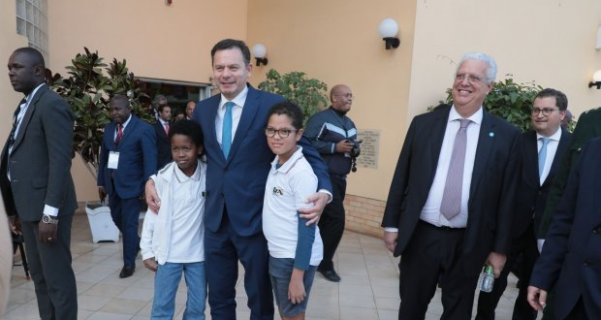Luís Montenegro visited, this Tuesday, the Portuguese School of Luanda, as part of the three-day official visit he is carrying out to Angola, at the invitation of the President of the Republic João Lourenço.
"Firstly, this Portuguese school, like others, is obviously a source of extreme cooperation between Portugal and Angola and is also a way for us, through our education system, to be close to our community and at the same time attract to teaching Portuguese to children and young people who are not of Portuguese descent", he highlighted.
Generally speaking, Montenegro considered the various Portuguese schools as "a very powerful instrument" and one of the most effective for the preservation of Portuguese identity, culture and language.
In the specific case of Luanda, the prime minister pointed out that it was "one of the first matters" analyzed by the PSD/CDS-PP Government, after taking office at the beginning of April.
At issue is a situation of 70 teachers "in a situation of serious precariousness" for more than two years, with the Government having approved a diploma in the Council of Ministers to ensure that the contracts of these teachers who end on August 31st can be integrated into the career or guarantee a stable employment contract, having already taken the Portuguese Minister of Education, Fernando Alexandre, to the Angolan capital twice.
"It was very important and it is important to have the issue of the stability of the teaching staff and its normal functioning resolved. The situation is not completely overcome, but we are making a great effort", said, this Tuesday, the Portuguese Prime Minister.
At the Portuguese School of Luanda, where more than 2000 children and young people study (between pre-school and 12th grade), Montenegro heard the national anthems of Angola and Portugal sung by six students and visited the facilities, currently deserted due to to school holidays.
In the school library, the Prime Minister of Portugal left "As Obras Completas" by the poet Luís Vaz de Camões as a gift.
"I brought a small souvenir that has everything to do with what I just said, with the teaching of our language, with our historical identity, with the preservation of our culture and with the recognition that we must have for those who are our bigger", he praised.
From school, Luís Montenegro went on a visit to Fortaleza de São Miguel, a 16th century military fortification that became a museum after Angola's independence, with the agenda for the first day of the visit ending in the late afternoon with a community reception Portuguese, in a hotel in Luanda.
The Portuguese Prime Minister's official visit to Angola ends on Thursday night.







